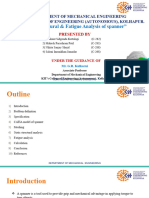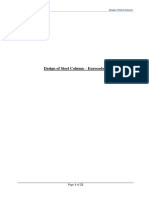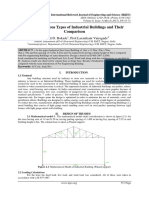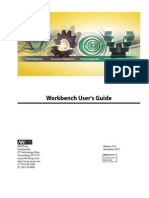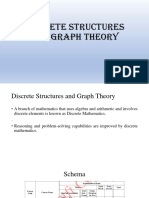ECTS-Bogen - Mec. Engineer. Mngm.
ECTS-Bogen - Mec. Engineer. Mngm.
Uploaded by
Gajanan JadhavCopyright:
Available Formats
ECTS-Bogen - Mec. Engineer. Mngm.
ECTS-Bogen - Mec. Engineer. Mngm.
Uploaded by
Gajanan JadhavOriginal Description:
Original Title
Copyright
Available Formats
Share this document
Did you find this document useful?
Is this content inappropriate?
Copyright:
Available Formats
ECTS-Bogen - Mec. Engineer. Mngm.
ECTS-Bogen - Mec. Engineer. Mngm.
Uploaded by
Gajanan JadhavCopyright:
Available Formats
Program Mec. Engineer. Mngm.
Below you will find the subject specific requirements for TUHH's international Master's program in "Mec. Engineer. Mngm.".
At first please pay attention to the actual requirements themselves. You will notice that each "field" of requirement may list rather specific subject areas one has to
fulfill. Please note that these specific areas are mandatory, meaning that if you already notice a lack of knowledge in one or more areas, you might not have a high
chance for admission in the long run.
Now please complete the colored columns on the right side of the listed requirements. Please fill in the academic knowledge and skills you have achieved or will
achieve prior to your potential studies at TUHH. Please fill the form to the best of your knowledge.
FAQ:
What does ECTS mean? ECTS (European Credit Transfer System) credits are based on the workload students need in order to achieve expected learning
outcomes. Workload indicates the time students typically need to complete all learning activities (such as lectures, seminars, projects, practical work, self-study
and examinations) required to achieve the expected learning outcomes. 60 ECTS credits are attached to the workload of a fulltime year of formal learning
(academic year) and the associated learning outcomes. 1 ECTS credit corresponds to 30 hours of work load.
The form lists credit points (ECTS). My university has a different measurement unit. No problem, you can also use other units like CP or hours. Just make sure
that you use one unit throughout the whole form. And don't forget to help us understand your statements by naming the unit of your choice in the corresponding
box.
My studies took more than three years. Will that factor be considered by the university? Yes, it will. Just make sure that you write down both: the regular duration
of your studies as well as the total number of units (e.g. ECTS, CP, hours) you have achieved after completion of your studies.
Some of my courses touch more than one required subject area. How should I proceed? In that case, you will have to split your measurement units accordingly.
Do not multiply your knowledge by putting the full number of units into all boxes in question.
You may supply supplementary information if necessary (a maximum of 500 characters):
No supplementary information
Field Requirements Required units (ECTS) Units Explanation (name of the
achieved after subject according to the
completion of Transcript of Records e.g.)
studies
Mathematics 24 29
Differential equations 4 5 Engineering Mathematics2,
Engineering Mathematics 3
Foundations of differential and integral 12 14 Engineering Mathematics 1,
calculus of one and several variables: Engineering Mathematics 2,
convergence of sequences and series; Engineering Mathematics 3
continuous and differentiable functions; power
series and elementary functions; integration
theory in one variable (proper + improper
integrals, fundamental theorem, integration
rules, parameter dependent integrals);
integrals over general regions; periodic
functions and Fourier series; implicit
functions; minimization under equality
constraints
Linear Algebra: general vector spaces 8 10 Engineering Mathematics 1,
(subspaces, inner and cross product, Euclidean Engineering Mathematics 3
vector spaces); systems of linear equations
(Gauß elimination, inverse matrices, block
matrices, determinants); linear mappings
(basis transformation, orthogonal matrices);
orthogonal projection in R^n, Gram-Schmidt-
Orthonormalization; eigenvalues
(diagonalizing matrices, normal matrices,
symmetric and Hermitian matrices, Jordan
normal form); matrix factorizations (LU, QR,
Schur, SVD)
Mechanics 24 32
Strength/mechanics of materials 6 8 Strength Of Materials
Statics 6 10 Engineering Mechanics,
Strength Of Materials
Kinematics, dynamics, analytical mechanics, 12 14 Theory Of Machines 1,
multibody systems, oscillations Theory Of Machines 2,
Dynamics Of Machinery
Fundamentals of Mechanical 54 84
Engineering
Measurement technology (metrology, 6 12 Meterelogy and Quality
instrumentation) Control, Mechatronics, CAD
CAM automation
Control engineering (control theory, control 6 8 Basic Electronics Engineering
systems)
Computer science (automata theory, data 6 9 Fundamental Programming
structures, programming languages) Language 1, Fundamental
Programming Language2,
Numerical Methods And
Optimization
Thermodynamics (1st and 2nd Law, equations 6 14 Thermodynamics, Applied
of state, vapors, clockwise and counter Thermodynamics
clockwise cycles, gas-steam mixtures)
Materials science (material properties, 6 8 Material Sciences,
material testing) Engineering Metallurgy
Manufacturing processes (casting, imaging, 6 10 Manufacturing Process 1,
coating, moulding, forming, machining, Manufacturing Process 2
joining)
Mechanical engineering design (design 12 15 Design of Mechanical
process and methods; theory, application and elements 1, Design Of
dimensioning of basic and advanced machine Mechanical Elements 2,
elements) Mechanical System Design
Elements
Electrical engineering (direct & alternating 6 8 Basic Electrical Engineering
current, electronics)
Foundations of Management 6 12
Business Administration, Management, 6 12 Energy Audit And
Economics Management, Soft Skills
Unit used in this form (hours, ECTS e.g.): CP
Total number of units achieved during the studies: 157
Regular duration of studies (in years): 4
You might also like
- HW1 ReportDocument3 pagesHW1 ReportAbdul Ahad100% (1)
- Static Structural and Fatigue Analysis of SpannerDocument17 pagesStatic Structural and Fatigue Analysis of Spannerprashant kottalagiNo ratings yet
- Motivation Letter For TU DresdenDocument2 pagesMotivation Letter For TU DresdenMohamad AlkadiriNo ratings yet
- Laplacian KernelDocument5 pagesLaplacian Kernelashraf11No ratings yet
- Tuhh Ects 3Document6 pagesTuhh Ects 3Nikhil KumarNo ratings yet
- You May Supply Supplementary Information If Necessary (A Maximum of 500 Characters)Document2 pagesYou May Supply Supplementary Information If Necessary (A Maximum of 500 Characters)Gajanan Jadhav100% (1)
- You May Supply Supplementary Information If Necessary (A Maximum of 500 Characters)Document3 pagesYou May Supply Supplementary Information If Necessary (A Maximum of 500 Characters)noor hasanNo ratings yet
- Purdue University SoP (Aerospace)Document1 pagePurdue University SoP (Aerospace)Rahul BanerjeeNo ratings yet
- Batch MeshDocument23 pagesBatch MeshjibharatNo ratings yet
- Analysis of Tensile Test Data Using MS ExcelDocument22 pagesAnalysis of Tensile Test Data Using MS ExcelLokesh Sangabattula100% (2)
- Op ArtDocument14 pagesOp Artpaloma_rodrigue6203100% (1)
- ECTS-Bogen - Mec. Engineer. Mngm.Document2 pagesECTS-Bogen - Mec. Engineer. Mngm.praveen2561993No ratings yet
- M.Tech - CADCAM - 1 PDFDocument105 pagesM.Tech - CADCAM - 1 PDFHarshalNo ratings yet
- Design of Steel ColumnDocument22 pagesDesign of Steel ColumnN.S.M.RAVI KUMARNo ratings yet
- AutoCAD Command ShortcutsDocument9 pagesAutoCAD Command Shortcutsbemd_aliNo ratings yet
- Readme Program ABD (Composite Material)Document5 pagesReadme Program ABD (Composite Material)benyfirstNo ratings yet
- SopDocument4 pagesSopSamir ShaikhNo ratings yet
- I6325571 170713065236 PDFDocument17 pagesI6325571 170713065236 PDFshoebNo ratings yet
- Advanced Machining ProcessesDocument106 pagesAdvanced Machining ProcessesyogeshNo ratings yet
- Abaqus Tutorial 28 Disk Brake Friction SimuleonDocument10 pagesAbaqus Tutorial 28 Disk Brake Friction SimuleonKarim N. SalloomiNo ratings yet
- Mech-Intro 13.0 L08 ResultsDocument45 pagesMech-Intro 13.0 L08 ResultsRichard HilsonNo ratings yet
- Tnea 2022 Round 4 Voc + Gen + 7 5 Grand Analysis Ashwin RDocument44 pagesTnea 2022 Round 4 Voc + Gen + 7 5 Grand Analysis Ashwin RSai Dhanush100% (1)
- Mabani PEB Manual PDFDocument265 pagesMabani PEB Manual PDFUppala Krishna ChaitanyaNo ratings yet
- STI09 ANSYS 6.0 Function EditorDocument27 pagesSTI09 ANSYS 6.0 Function EditorTomáš BrtníkNo ratings yet
- PEB Application FormDocument11 pagesPEB Application FormArldiIshmanRachmanNo ratings yet
- Letter of Motivation. Water Resources StuttgartDocument2 pagesLetter of Motivation. Water Resources StuttgartMFUH100% (1)
- Strength of MaterialsDocument3 pagesStrength of Materialsvp0209198825% (4)
- Letter of MotivationDocument2 pagesLetter of MotivationAnonymous DDuRkFHRNo ratings yet
- Master Course Programme Computational EngineeringDocument3 pagesMaster Course Programme Computational EngineeringNadia Ordoñez100% (1)
- Mecway Finite Element Analysis: ManualDocument137 pagesMecway Finite Element Analysis: ManualJAVIER AWESOMENo ratings yet
- Equivalent Moment Factor C1Document2 pagesEquivalent Moment Factor C1baharfka7423No ratings yet
- Ansys Elements PDFDocument1,401 pagesAnsys Elements PDFprashanthattiNo ratings yet
- Tutorial of WRC 107 For TrunnionDocument10 pagesTutorial of WRC 107 For TrunnionGuru MoorthiNo ratings yet
- 2D-Exercise: Design & Developed by Indo-Danish Tool Room, JamshedpurDocument23 pages2D-Exercise: Design & Developed by Indo-Danish Tool Room, JamshedpurShubham GuptaNo ratings yet
- Abbd Matrix Matlab CodeDocument3 pagesAbbd Matrix Matlab CodeKamineni JagathNo ratings yet
- Senior Mechanical Design Engineer in San Francisco Bay CA Resume Andrew SmithDocument2 pagesSenior Mechanical Design Engineer in San Francisco Bay CA Resume Andrew SmithAndrewSmith3No ratings yet
- C++ Fem Object OrientedDocument17 pagesC++ Fem Object OrientedTuýp Phờ NờNo ratings yet
- Structural Steel Design CalculationsDocument34 pagesStructural Steel Design Calculationsthiện100% (1)
- GD&T Presentation by DeepakDocument34 pagesGD&T Presentation by DeepakgocoolonNo ratings yet
- German ShortlistDocument2 pagesGerman Shortlistshiva shankerNo ratings yet
- ANSYS WorkbenchDocument19 pagesANSYS WorkbenchSudhanwa KulkarniNo ratings yet
- Design of Fixture For Full Bore Gate Valve - ReviewDocument31 pagesDesign of Fixture For Full Bore Gate Valve - ReviewAlpha Ray KingsNo ratings yet
- Motivation Letters - Management & Mechanical - Naveed IqbalDocument4 pagesMotivation Letters - Management & Mechanical - Naveed IqbalNamrah KhanNo ratings yet
- Tekla Structures: Drawing ManualDocument243 pagesTekla Structures: Drawing ManualKa KaNo ratings yet
- Abaqus Truss TutorialDocument20 pagesAbaqus Truss Tutorialhfathollahi100% (1)
- Workbench Users Guide 15Document294 pagesWorkbench Users Guide 15ppyim2012No ratings yet
- Suggested Thesis Topics For Mechanical EngineeringDocument5 pagesSuggested Thesis Topics For Mechanical Engineeringtashahollowaylittlerock100% (2)
- Column - Buckling - Example With Abaqus PDFDocument4 pagesColumn - Buckling - Example With Abaqus PDFAnonymous xRgrWSUNNo ratings yet
- You May Supply Supplementary Information If Necessary (A Maximum of 500 Characters)Document2 pagesYou May Supply Supplementary Information If Necessary (A Maximum of 500 Characters)Vedant ShrivastavaNo ratings yet
- ECTS-Bogen MechatronicsDocument2 pagesECTS-Bogen MechatronicsUmair SarwarNo ratings yet
- Chapt 9Document11 pagesChapt 9dolituaNo ratings yet
- Ects-Bogen Mem 20192Document1 pageEcts-Bogen Mem 20192surya reddyNo ratings yet
- Engineering Mathematics1 2015 PDFDocument24 pagesEngineering Mathematics1 2015 PDFsenyonjo emmaNo ratings yet
- Fachspez. Anforderungen IMPMEMDocument2 pagesFachspez. Anforderungen IMPMEMPrateeksha ShakyaNo ratings yet
- Mechanical Engineering: Bachelor of Science in (BSME)Document1 pageMechanical Engineering: Bachelor of Science in (BSME)Ahsen ZubairNo ratings yet
- Gate Syllabus - Computer Science and EngineeringDocument2 pagesGate Syllabus - Computer Science and EngineeringAmit JhaNo ratings yet
- Tuhh Ects (Excel) NewDocument1 pageTuhh Ects (Excel) NewRajan SinghNo ratings yet
- TRB Mechanical TopicsDocument8 pagesTRB Mechanical TopicsASHOKNo ratings yet
- Hamburg MicroelectronicsDocument1 pageHamburg MicroelectronicsAmrith VenkatNo ratings yet
- NMO-Lecture 1-Root of EquationsDocument20 pagesNMO-Lecture 1-Root of EquationsPrakash SutarNo ratings yet
- R23 Syllabus Maths 271123Document7 pagesR23 Syllabus Maths 271123munnaiitr100% (1)
- Mathematics Module Volume 2 - FINAL4WEBDocument380 pagesMathematics Module Volume 2 - FINAL4WEBKupa100% (1)
- ComplexityTheoryPNPNP CompleteandNP HardDocument9 pagesComplexityTheoryPNPNP CompleteandNP HardSamer ZaouamNo ratings yet
- Maths Class VIII Session Ending Exam Sample Paper 01Document4 pagesMaths Class VIII Session Ending Exam Sample Paper 01Nooman ShaikhNo ratings yet
- Prime Factor Trees HCF LCM Answers MMEDocument2 pagesPrime Factor Trees HCF LCM Answers MMErabiawaqar85No ratings yet
- Addition and Subtraction of Functions FINALDocument27 pagesAddition and Subtraction of Functions FINALSue ZanneNo ratings yet
- Objective/Multiple Type QuestionDocument14 pagesObjective/Multiple Type QuestionMITALI TAKIAR100% (1)
- Coding DecodingDocument2 pagesCoding DecodinghosifaNo ratings yet
- Mark Scheme (Results) June 2016Document16 pagesMark Scheme (Results) June 2016Chibi EchanterNo ratings yet
- 12 CoorelationDocument25 pages12 Coorelationdranu3100% (1)
- 101 2020 0 BDocument13 pages101 2020 0 BRixizoNgobeniNo ratings yet
- LE Math 10 Multidisciplinary ApproachDocument14 pagesLE Math 10 Multidisciplinary ApproachJason LaroaNo ratings yet
- Virtual WorkDocument10 pagesVirtual WorkAhmad RazaNo ratings yet
- Semm3023 Project 1 202120222Document3 pagesSemm3023 Project 1 202120222Nur Hanim Abd GhaniNo ratings yet
- WWW - Ipu.ac - in Syllabus Bcaac1112290711Document2 pagesWWW - Ipu.ac - in Syllabus Bcaac1112290711Gautam BhallaNo ratings yet
- Example To Understand Support Vector Machine: CS 476 Introduction To Machine Learning, Module 5 Module 5 - SyllabusDocument37 pagesExample To Understand Support Vector Machine: CS 476 Introduction To Machine Learning, Module 5 Module 5 - Syllabusamarthya vNo ratings yet
- MIT18 014F10 PR Ex1 SolsDocument5 pagesMIT18 014F10 PR Ex1 SolsAnaheli PerezNo ratings yet
- Worksheet 1.8 Homework Piecewise FunctionsDocument6 pagesWorksheet 1.8 Homework Piecewise Functionspneimmapd100% (1)
- Teorija Malog Sveta: Primer Evolucije Matematičkog Modelovanja RealnostiDocument31 pagesTeorija Malog Sveta: Primer Evolucije Matematičkog Modelovanja RealnostiPeraKojotNo ratings yet
- DSGTDocument59 pagesDSGTabcyz141608No ratings yet
- MODULE1Document29 pagesMODULE1Sanju MalikNo ratings yet
- Mo Phong Matlab Ball and BeamDocument52 pagesMo Phong Matlab Ball and BeamHuong NguyenNo ratings yet
- Mathematics QM016 Topic 1: Number System - TutorialDocument4 pagesMathematics QM016 Topic 1: Number System - TutorialMohd NuuranNo ratings yet
- Metric Dimension of GraphDocument2 pagesMetric Dimension of Graphanon_212774706No ratings yet
- The Female Face of Civil Engineering: Supported byDocument9 pagesThe Female Face of Civil Engineering: Supported bySu Sandy TunNo ratings yet
- Review of Algebra and Trigonometry: Pamantasan NG CabuyaoDocument16 pagesReview of Algebra and Trigonometry: Pamantasan NG CabuyaoJhon Mark SantoniaNo ratings yet
- 2019 Sec 4 E Math SA2 CHIJ St. Theresa'sDocument41 pages2019 Sec 4 E Math SA2 CHIJ St. Theresa'sst hNo ratings yet
- MA324 Lecture NotesDocument240 pagesMA324 Lecture Notesabhaygupta0912No ratings yet

